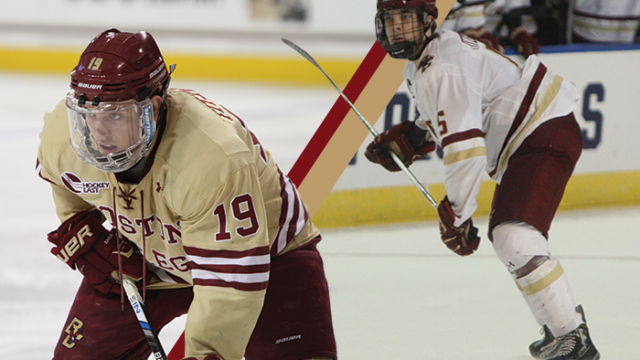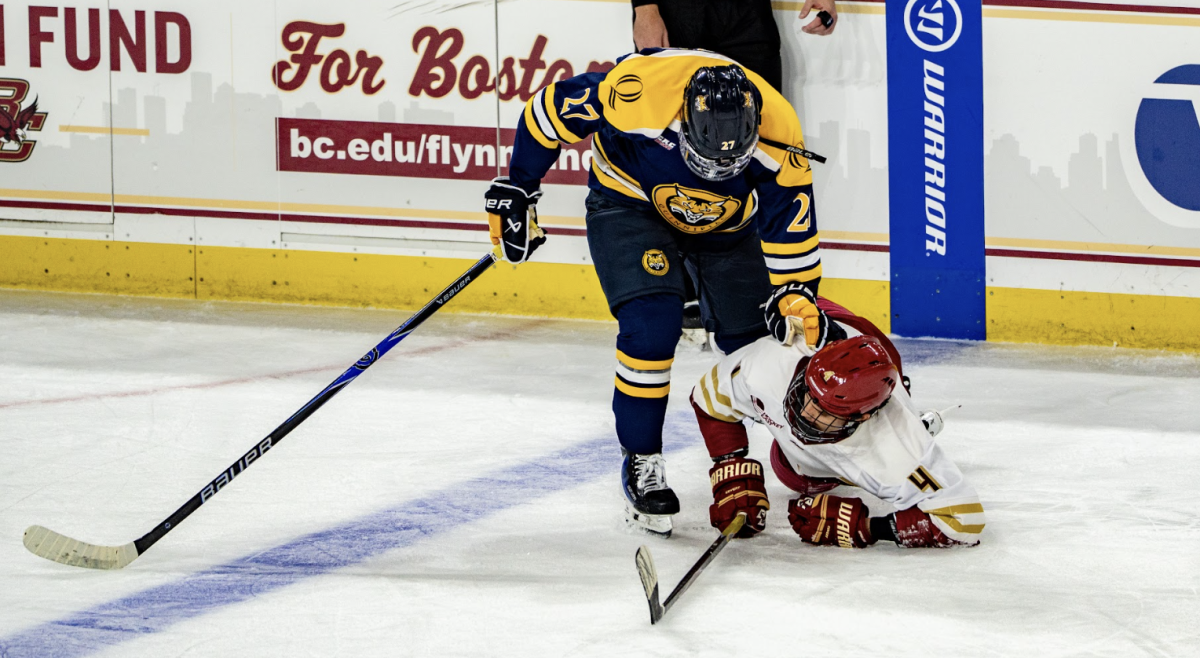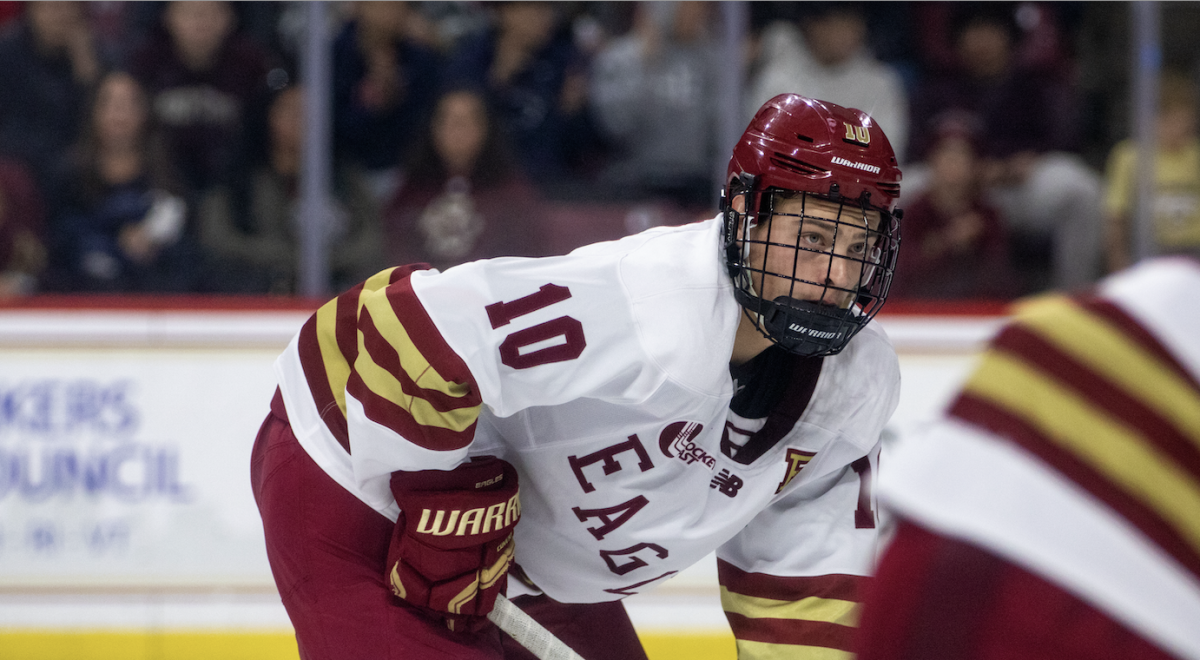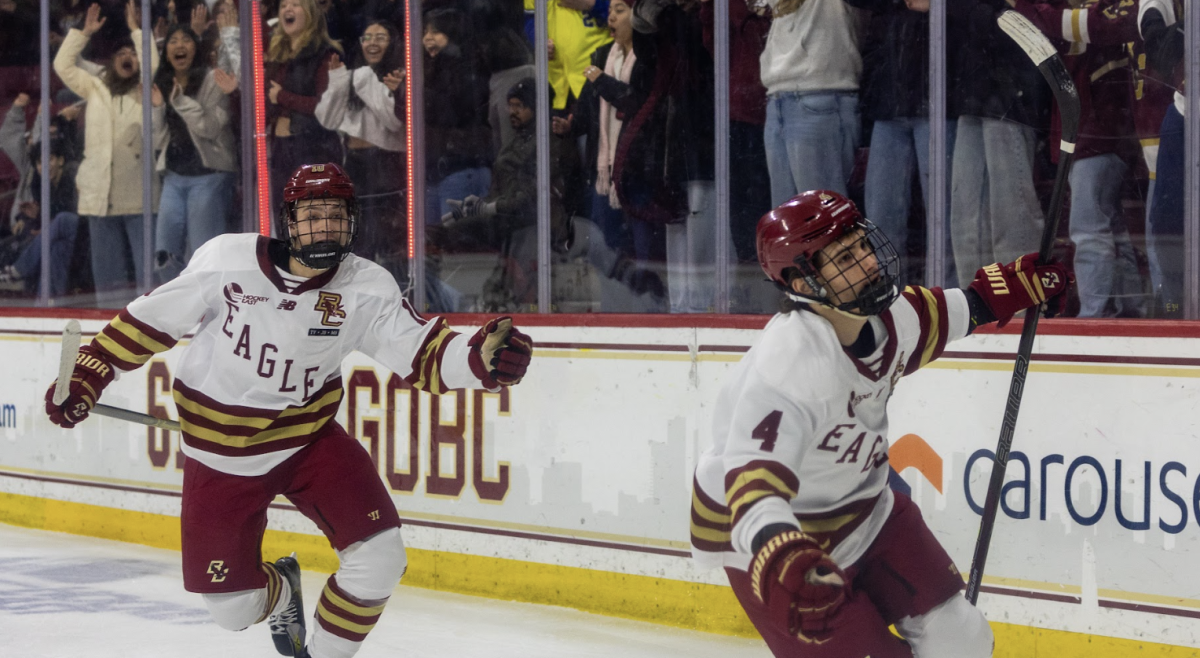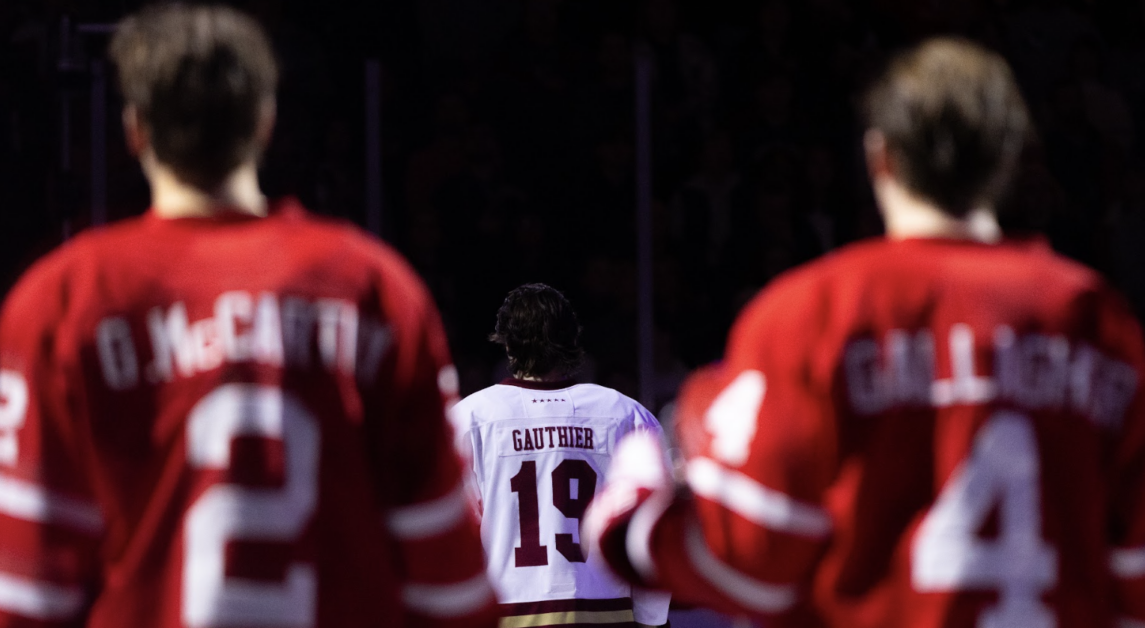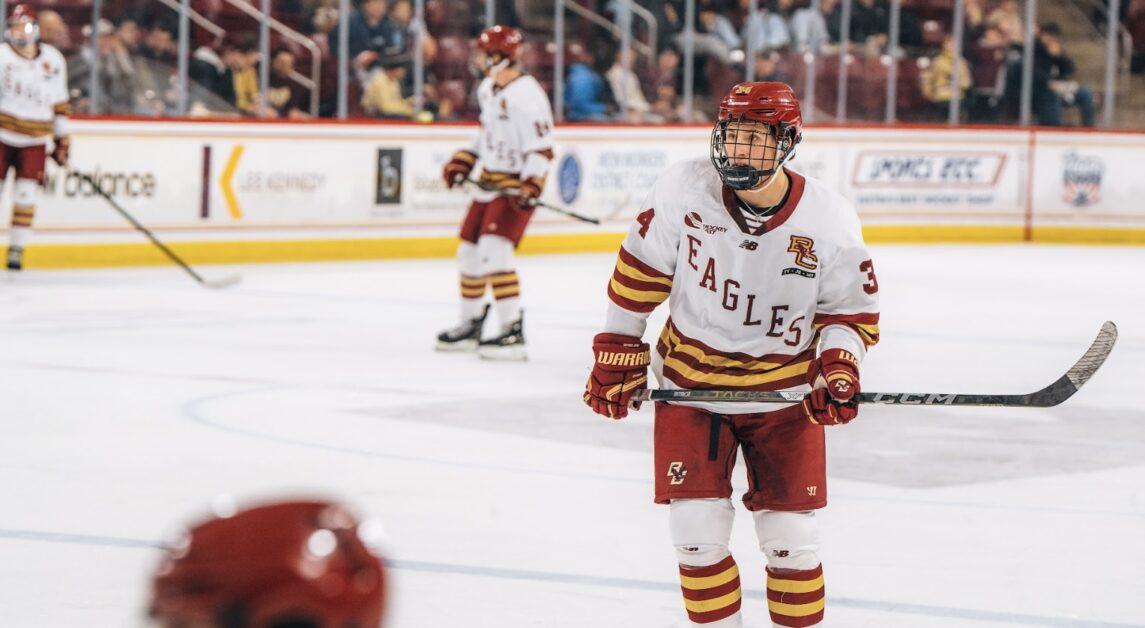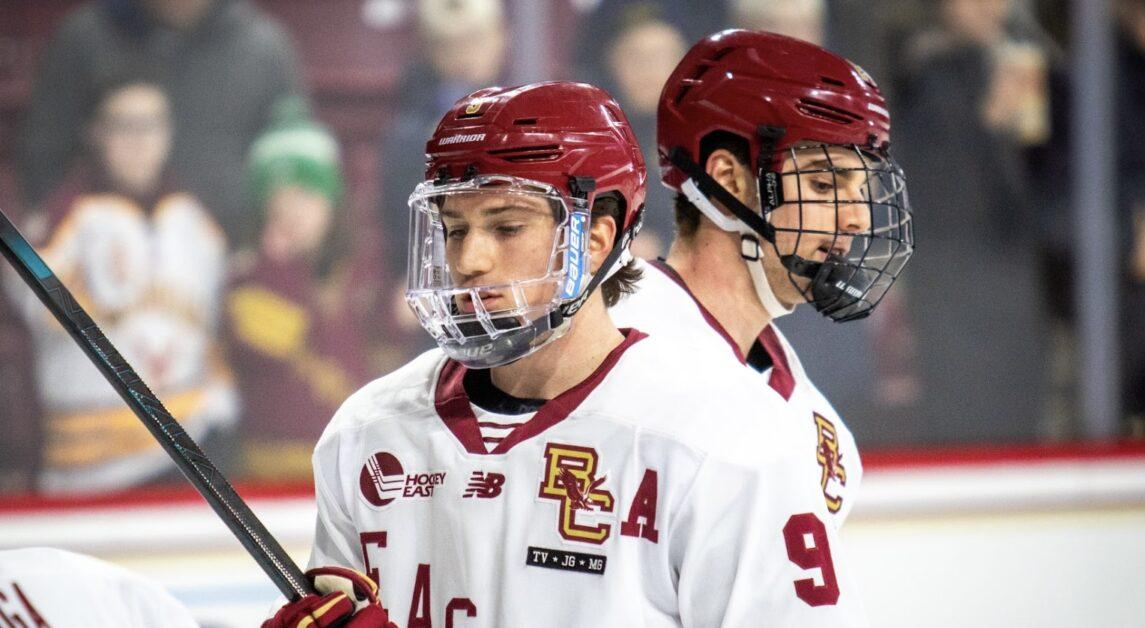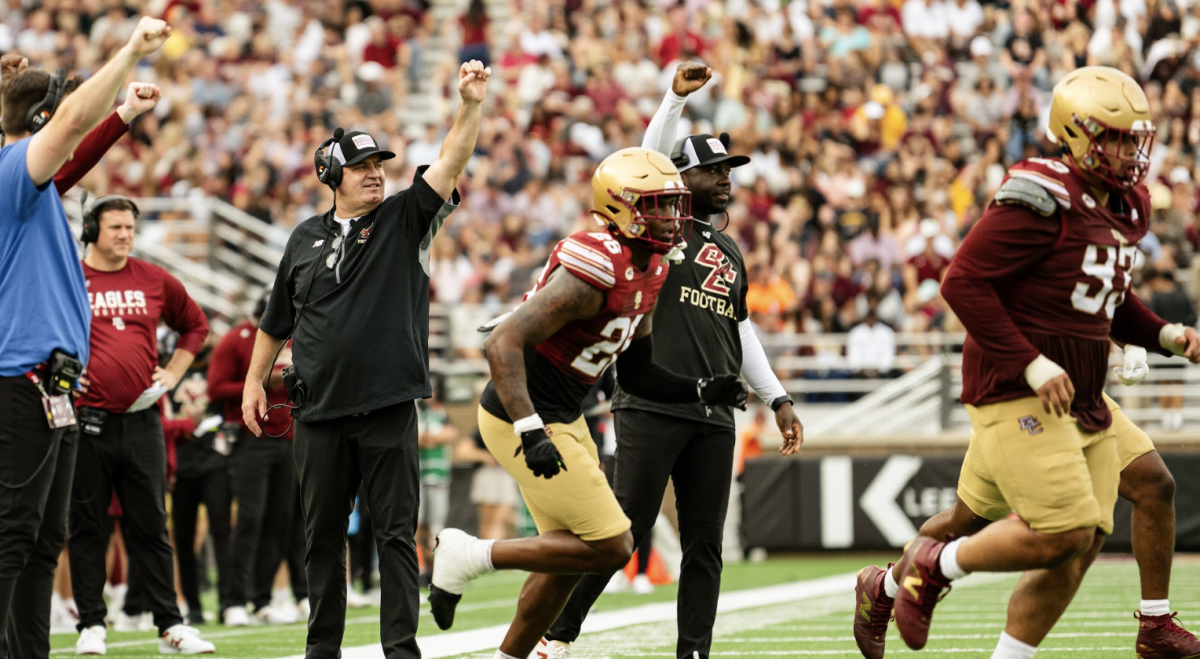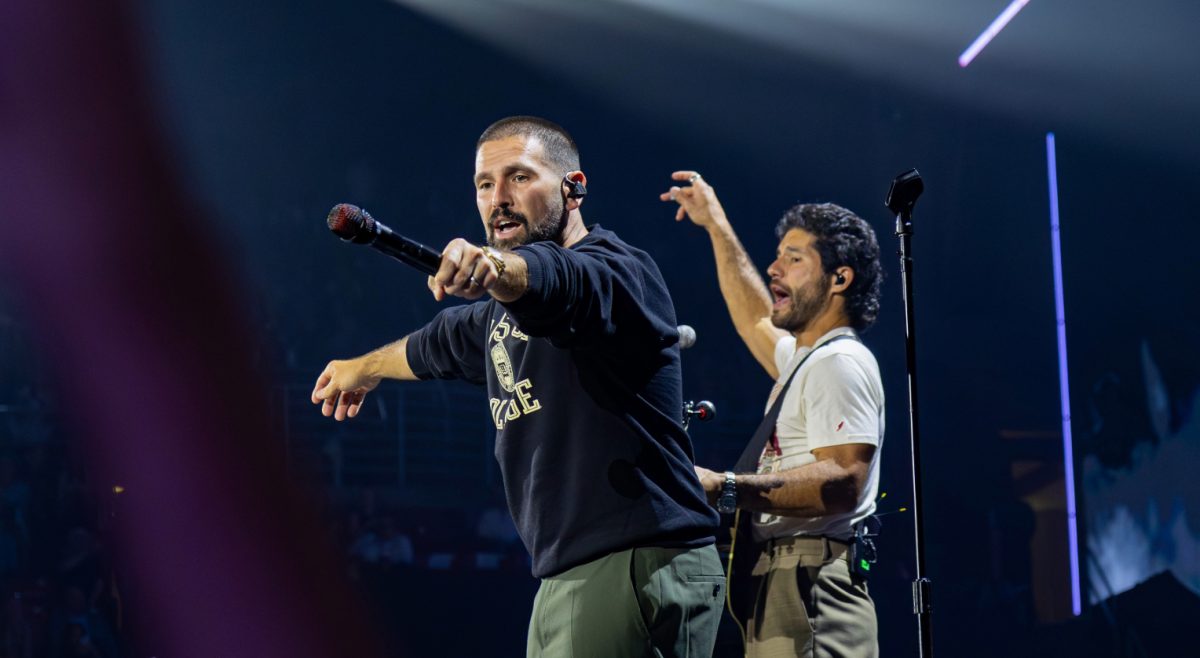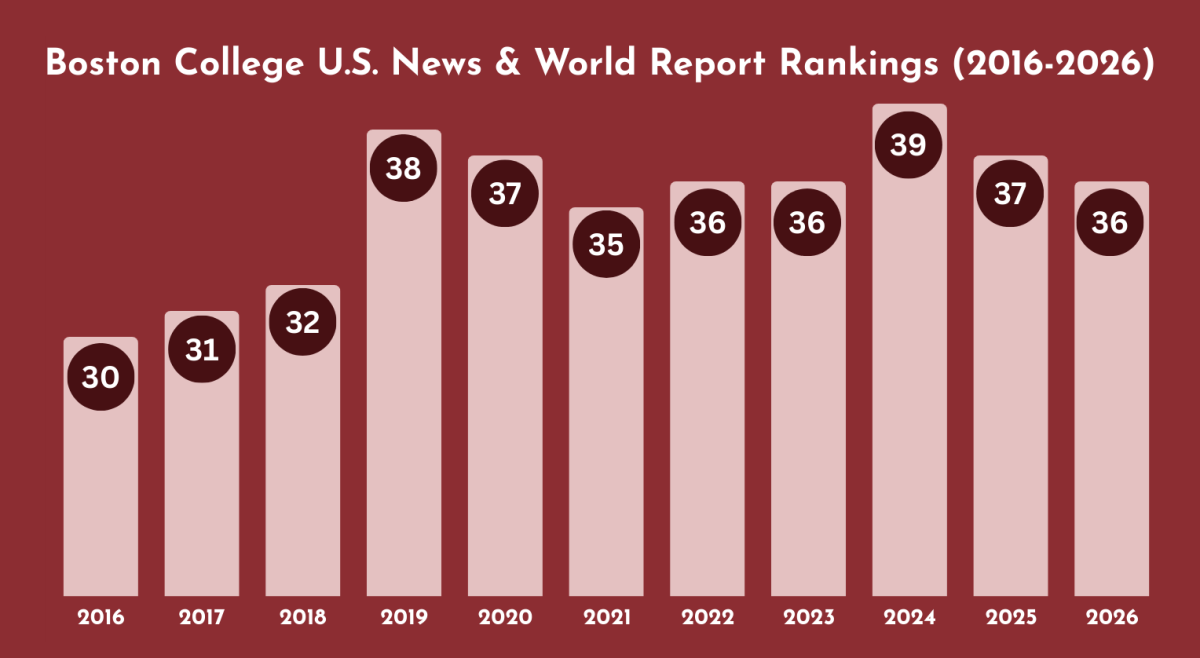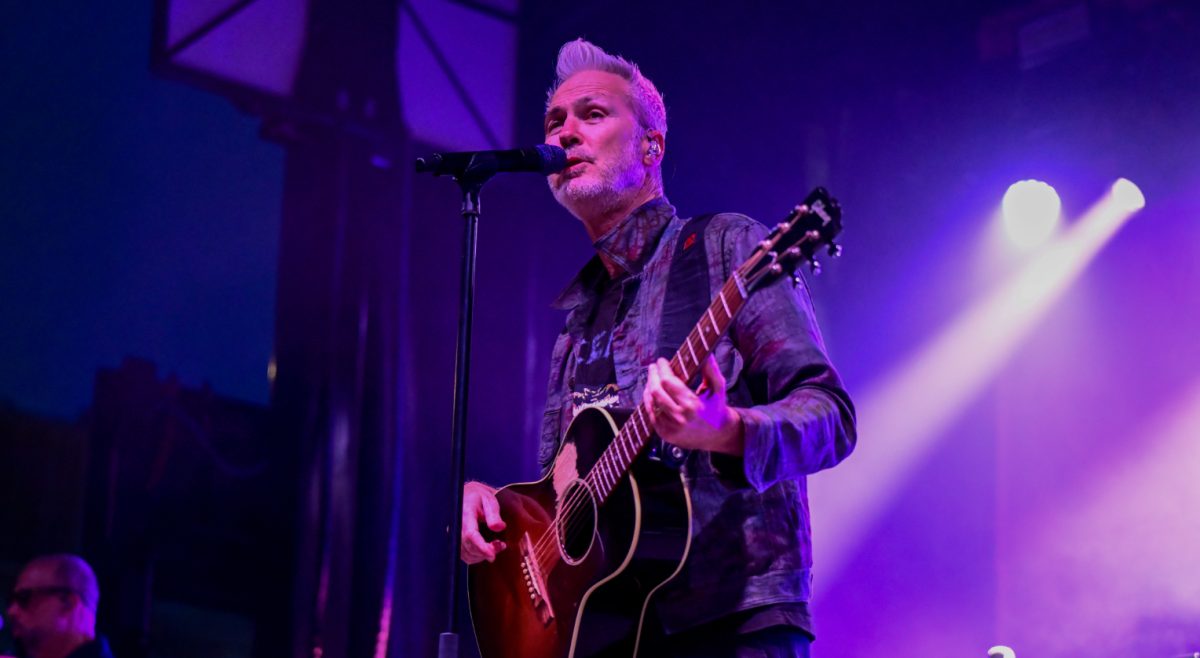Ryan Fitzgerald has had a flair for the dramatic this postseason.
Vermont (and its faithful fans who trekked down from Burlington) nearly took down Kelley Rink early in overtime during the final game of a best-of-three series with Boston College men’s hockey with a shot that almost crossed the goal line. Now on the brink of a third-consecutive Hockey East Quarterfinal collapse, BC used the momentum of the Catamounts’ missed opportunity to bombard goaltender Packy Munson. One by one, the freshman turned each of the Eagles’ opportunities away.
Until Fitzgerald stepped up.
The junior blasted a shot from between the circles that caromed off several Vermont defensemen and into the back of the twine. With his stick in the air and a small fist pump with his left hand, Fitzgerald was mobbed by his teammates. For the first time since 2013, the Eagles would have an opportunity to play a third game at TD Garden.

In the Northeast Regional, Fitzgerald did it yet again—though he wasn’t expecting this time to be so crucial.
Entering the third period up 2-0 on Minnesota Duluth and with Thatcher Demko showing no signs of letting up, BC looked destined for a trip to Tampa. But Fitzgerald, never satisfied, aimed to make his goaltender’s job a little easier.
“You’re never comfortable with a 2-0 lead,” Fitzgerald said after practice this week. “You always want a third.”
Fitzgerald measured up 6-foot-6 defenseman Brenden Kotyk, skating slowly to his right while deking back and forth. When he wound up, Kotyk lost his balance and lunged in front of Fitzgerald’s incoming shot. The junior exploited a screen in front of Duluth’s Kasimir Kaskisuo to sneak the puck just past his left arm. The goal gave BC the cushion it would need to survive a Duluth onslaught in the game’s waning minutes, moving on to the Frozen Four with a 3-2 victory.

BC couldn’t have gotten to this point without Fitzgerald. But Ryan couldn’t have gotten the glory without his little brother, Casey.
Maybe it’s just a matter of luck that the younger Fitzgerald, a freshman defenseman, is on the ice at the same time as Ryan. Yet on both of those critical goals, the play began on Casey’s stick. In fact, five of Ryan’s goals this season have begun with an assist from his brother. That’s more than any other BC defenseman, and only behind Ryan’s two linemates for most of the season: Colin White and Matthew Gaudreau (eight assists each on Ryan’s goals).
Two of those five goals were Ryan’s game-winners in the playoffs. But, never to be outdone, Casey has found the back of the net with Ryan’s help twice this year. One came in the Beanpot opener against Harvard. The second was in a 5-5 tie in North Andover, Mass. against Merrimack, just minutes after Casey had assisted Ryan on a goal of his own.
When they’re not creating clutch plays for each other, they’re doing it for their teammates. Twice this season, Ryan and Casey have assisted on goals scored by another Eagle. Both have come in the playoffs, most notably J.D. Dudek’s game-tying—and first-career—goal in the third game against Vermont that helped put BC into overtime.

Casey believes their chemistry comes naturally. The two took to the streets to play hockey while growing up in North Reading, Mass., alongside their younger brothers Brendan and Jack. They also played together at Malden Catholic, where they won the Super Eight Tournament together in 2011-12. When both are on the ice, the two seem to mesh in a big way for BC.
“He’s a pretty good player, so I try to get the puck to him and see him get the job done,” Casey said.
It’s certainly not a surprise that the Fitzgerald brothers are contributing big minutes and plays for the Eagles in the 2015-16 season. But how far they are exceeding their preseason expectations has been a key reason for BC’s jump from borderline contender to a nation’s-best 25th trip to the Frozen Four.
Start by taking a look at the younger Fitzgerald. After committing to BC in his freshman year, Casey played with the U.S. National Development Program (USNTDP). In 57 games for the U-18 team, Casey notched 25 points (nine goals, 16 assists) and had the highest plus/minus of any player during the United States’ gold-medal-winning campaign in the 2015 IIHF U-18 Men’s World Championships. Nevertheless, at only 5-foot-11, 185 pounds, Casey went undrafted as an undersized defenseman.
The fact that NHL teams weren’t looking to take a flyer on Casey caused some alarm at BC, where it was anticipated that minimizing shots aimed toward Demko would be the team’s Achilles heel in 2015-16. After losing Noah Hanifin and Mike Matheson to the allure of the NHL, the Eagles were depleted among the defensive ranks. They’d return three stalwarts in Ian McCoshen, Scott Savage, and Steve Santini. Teddy Doherty’s status was uncertain given that he shuffled between forward and defense last season. That left Travis Jeke to break in the two freshmen: Casey and Josh Couturier.
Yet when Brendan Silk went down in the first game of the season, Jeke had to move up and take his place on the fourth line. Casey, who didn’t expect to play much, was now thrown fully into the fire. Head coach Jerry York moved him onto the first defensive pairing with McCoshen, and Casey thrived. He and the defense became one of the country’s toughest units. Casey believes that everyone telling the defense that it couldn’t do it without Hanifin and Matheson only drove it to work harder.
“We just looked around and said, ‘You know what? We’re a pretty good D corps,’” Casey said. “We can do it without them.”
Ryan isn’t shocked at Casey’s fast development. He believes that Casey was merely limited with the USNTDP and needed a bigger chance to play. Even Casey didn’t see this much success coming. He loves to keep the offense in the front of his brain, citing puck movement to BC’s excellent forwards as his most polished skill. That’s certainly proven true—Casey’s 26 points (four goals, 22 assists) lead the team’s defensemen.
“Yeah, I’m having a pretty good year, I would say,” Casey said with a laugh.
While Casey’s rise was necessary to keep BC functioning, Ryan’s jump from a good second- or third-line player to one of college hockey’s most feared goal scorers has propelled BC to sunny and scenic Tampa.
That’s not to say he wasn’t performing before this season. Ryan had steady production in his first two years. As a freshman under the guidance—or in the shadow—of Johnny Gaudreau, Kevin Hayes, and Bill Arnold, Ryan quietly compiled an impressive campaign with 13 goals and 16 assists, the most out of BC’s freshmen. In his sophomore year, Ryan became more of a force on the Eagles. He led the team with 17 goals and earned his reputation as a high-quantity shot producer, with 125. During that season, he earned his mark as a clutch performer with BC’s most recent hat trick and an overtime-winner against Harvard in the consolation game of the 2015 Beanpot.
Yet, according to Casey, Ryan said that this year was going to be his year. He worked hard this offseason, both at home with his brother and at the development camp for the Boston Bruins, the team that drafted him in the fourth round back in 2013. Now, Ryan has become the complete player that he’s always wanted to be.
Though he primarily plays left wing, Ryan has showed his skill as a center. On JY1K Night against New Hampshire, Ryan’s linemate, White, had to leave with an upper-body injury. The situation was not exactly ideal for the Eagles: a faceoff in their own zone, up by one, 10 seconds remaining, and two of Hockey East’s most dangerous scorers—Andrew Poturalski and Tyler Kelleher—on the ice. Instead of going with an established master off the draw, like Austin Cangelosi, York rode the hot hand in Ryan Fitzgerald.
Ryan’s left-handed shot allowed him to perfectly win the puck and dish it to safety, giving BC a victory. It’s just one of many faceoff wins in a secret skill for the left winger. He has 170 wins to only 128 losses, a .588 success rate that’s 26th-best in the nation and second on the Eagles only to Cangelosi.
It’s his scoring that elevated Ryan to the All-Hockey East and All-New England First Teams. With one (or, ideally for BC, two) games remaining, Ryan leads the Eagles with 23 goals and 23 assists. His 23 goals was eighth-most in the country. Ryan’s 15 goals in Hockey East play were the most in the conference, and his 31 points in HEA play overall had him tied with White behind only Poturalski, BU’s Danny O’Regan, and Northeastern’s Zach Aston-Reese. His five game-winning goals and three shorthanded goals each lead the team. And, with that game-winner against Duluth, Ryan now has 100 points for his career. To Casey, it was only fitting.
“There’s no better time to get your 100th point,” Casey said.
Most notably, Ryan ranks fifth in the country in shots, with 160. BU’s Ahti Oksanen, Robert Morris’ Greg Gibson, Vermont’s Mario Puskarich, and Michigan’s Tyler Motte all have more than him. But of those top five in players who take aim at the net, Ryan is the best at actually getting the puck on the goaltender. At a 62-percent clip, Ryan creates scoring attempts with rebounds more effectively and more frequently than any player in the nation. When informed of that stat, Ryan laughed and said he was pleased to hear it.
“I try to only take smart shots,” Ryan said. “I’m not just shooting to shoot.”
But it all comes back to succeeding in the most important situations. Between Ryan’s two goals against UMass Lowell that earned BC the No. 1 overall seed in the Hockey East Tournament and clinched a share of the conference’s regular season title, or his game-winners in the playoffs, the Fitzgeralds merely want to win. After all, it runs in their blood. Their father, Tom, was an integral part of the Florida Panthers during their run to the Stanley Cup in 1995-96 and now works in the front office of the New Jersey Devils. Keith Tkachuk, one of the best U.S.-born hockey players, is a cousin, as well as his son, Matthew, who Casey has played alongside on the USNTDP. Their other cousins, Kevin and Jimmy Hayes, have won national championships at BC.
Now, it’s their turn. After Ryan took a backseat in 2014, he has the fire to get another star on the BC sweater. And it all starts with a business trip to the Amalie Arena.
“You grow up watching BC win all the national championships, and you want to be a part of it,” Ryan said. “My freshman year we came up short, and you kind of have that feeling in the back of your mind that you know what it takes to win it the second time around.”
Featured Image by Abby Paulson / Heights Editor

